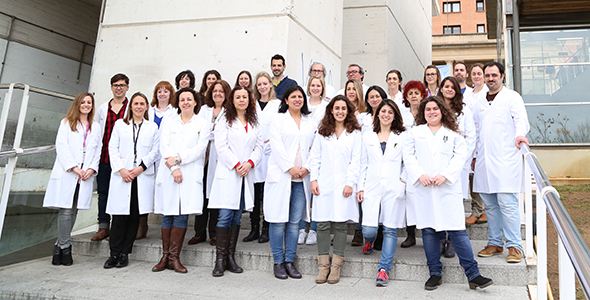Digestive & Liver Diseases
Physiology & Pathophysiology of the Digestive Tract
Fernando Azpiroz
Researchers Ana María Accarino Garaventa, Carmen Alonso Cotoner, Natalia Borruel Sainz, Francesc Casellas Jordá, Francisco Guarner Aguilar, Beatriz Lobo Álvarez, Kathleen Jean Marie Flora Machiels , Carolina Malagelada Prats, Chaysavanh Manichanh , Francesc Xavier Molero Richard, Javier Santos Vicente, Maria Vicario Pérez, Jaume Vilaseca Momplet | Researchers in training Barbara Ciccantelli , Claudia Maria Herrera de Guise, Marianela Mego, Suchita Panda , Virginia Robles Alonso, Eloísa Salvo Romero, Encarna Varela Castro, Ana Maria González Castro, Victoria Pascal Andreu, Marta Pozuelo del Rio, Teodora Pribic, Bruno Kotska Rodiño Janeiro | Nursing, Technical and Administrative Staff Raimunda Carmen Alastrue Borbón, Elisabeth Barba Orozco, David Campos Marín, Milagros Gallart Mora, Josefa Mª Heredia Montiel, Xavier Martínez Serrano, Laura Molne Aricha, Adoración Nieto Ruiz, Gloria Santaliestra Vivaracho, Alba Santiago Badenas, César Javier Sevillano Aguilera


Summary
In a series of studies we have investigated the relation between meals/diet, intestinal content, gut function (reflex and sensory activity) and digestive sensations. Based on this background, we have moved a step forward to analyze the factors that determine the responses to meal ingestion both in healthy subjects and in patients with functional digestive symptoms, i.e. without detectable cause by conventional diagnostic techniques. This line of research has been awarded a research grant (IDI20150103 Centro para el Desarrollo Tecnológico Industrial, CDTI) and produced 12 scientific publications (63 IF) in 2015.
The Neuro-immuno-gastroenterology group is pursuing, through a holistic approach, the detailed knowledge of physiology and sequential pathophysiology of chronic intestinal inflammation, as a potential nexus to prevalent digestive diseases, associated with changes in motility and visceral sensitivity. From this standpoint, to better understand the mechanisms and dynamics of the inflammatory process, they have focused in irritable bowel syndrome (IBS), a disorder associated with low-grade inflammation, increasing prevalence, chronic and recurrent course, frequent association with other functional disorders and mostly ignored pathophysiology. The major scientific achievements last year were the identification of a distinctive mucosal humoral activity associated with clinical manifestations in IBS-D (Vicario M, et al. Gut. 2015; 64(9):1379-88). These data, together with previous observations, suggest that IBS-D does indeed have an organic basis involving mast cells, epithelial cells and T lymphocytes, and also humoral mucosal activation. In addition, our group has obtained funding for three years from the Instituto Carlos III (Ministerio de Ciencia e Innovación) to evaluate gender-dependent bacterial and epigenetic profiles in the pathogenesis of functional gastrointestinal diseases (PI: Carmen Alonso, PI15/00301) that will help to understand the pathophysiology of the regulation of intestinal permeability, and promoting a positive diagnostic and therapeutic future progress in IBS.
In 2015, the “Gut Microbiota” group has received the Spanish National Grant (PI15/0076), has integrated a post-doctorate fellow with Belgium grant and has received a grant for a PhD student. The group has published 3 articles in Decil 1 (total impact factor = 57) and the PI is part of the editorial Board of the mSystem journal (American Society for Microbiology).



